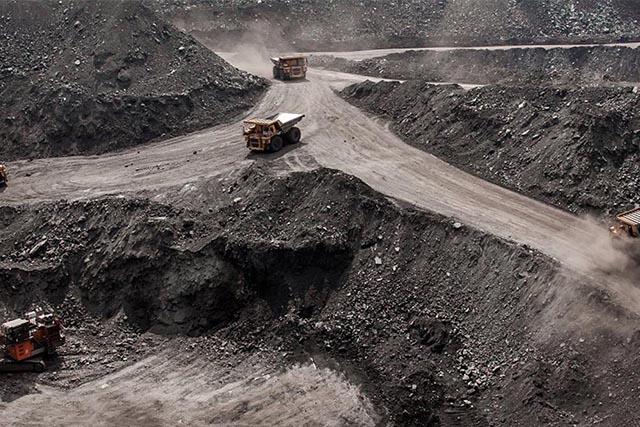Coal power plant construction will push ahead in Asia despite falling electricity demand and environmental concerns, as policymakers prioritize boosting economies crippled by the coronavirus pandemic, analysts say.
Fossil fuel demand will plunge this year as a lockdown of the usage of sap power, the International Energy Agency said in a study last month.
The European Union, the International Monetary Fund and the United Nations have said that this is a one-in-a-generation opportunity to launch a 'green recovery,' which includes Asia joining the global trend of ending support for coal.
But there are already signs that China and other Asian giants, such as South Korea and Japan, will be channeling recovery funds into struggling coal-focused state finance, equipment suppliers, and construction firms. This could produce a short-term jolt at the expense of productivity and environmental harm, analysts claim.
"China and other governments may be tempted to invest in coal to help their economies recover from the COVID-19 pandemic," said Matt Gray, co-head of power and utilities at Carbon Tracker, the climate think tank. "These risks lock in high-cost coal power that will undermine global climate targets."
China, which generates and consumes around half of the world 's coal, has said in recent weeks that it will enable more provinces to start building coal power plants starting in 2023. It has also accelerated the building of five plants and dedicated billions of dollars to cross-country power transmission lines.
China's imports of coal increased 22 per cent in April from the previous year, as traders jumped to low prices to build up their stocks and brace for a rise in domestic demand.
Coal power infrastructure in Asia relies heavily on state-sponsored financing from China, South Korea and Japan.
Japan and South Korea are expected to continue to fund coal-fired power plants in developing countries such as Vietnam and Indonesia to support state-sponsored industries as domestic coal operations wind down to meet carbon-emission obligations, analysts said.
Many proposed coal-fired power plants are not economically feasible and would burden governments with stranded assets and billions of dollars in debt, analysts said.
BAILOUTS
The long-term global outlook for coal is gloomy. Governments, banks and energy companies – under public and investor pressure – are dropping fossil fuel, which is seen as the biggest risk to the 2015 Paris agreement to cap global warming by 1.5 degrees Celsius.
Environmental experts say that this goal is already out of reach, partly because new coal plants are being built in Asia, the largest energy-consuming region and the largest growth market.
Approximately 500 gigawatts of coal power is expected or under development worldwide, with an investment cost of $638 billion, according to Global Energy Monitor, an NGO promoting the phase-out of fossil fuel. More than 80% of this is in Asia.
Just a handful of new plants will increase CO2 emissions and boost demand for coal mining in countries like Australia and Indonesia.
Two of Japan's largest banks, Mizuho Financial Group and Sumitomo Mitsui Financial Group Inc, announced plans to end the financing of coal last month, although the move does not extend to projects already planned.
The banks have not provided specific details on each planned project, including the $2 billion Vung Ang 2 coal-fired power station in Vietnam, which activists have warned will be disastrous for local communities and the environment.
South Korea's Democratic Party proposed a Green New Deal after last month's landslide election victory, including investment in renewable energy and an end to the financing of coal.
A month earlier, South Korea's Doosan Heavy Industries and Construction Co Ltd, a leading producer of coal-fired power plants, had made a quieter announcement that two state-owned banks would receive $2 billion in bailouts.
SOUTHEAST ASIA
Doosan Heavy is expected to supply coal-fired plants in South and South East Asia, where pollution requirements are lower than those in South Korea, including the $3.5 billion Jawa 9 & 10 coal-fired plants in Indonesia.
Vung Ang 2 and Jawa 9 & 10 ventures will proceed amid the bleak global investment climate and energy overcapacity concerns, two sources close to the ventures said.
“Coal is potentially less affected than other energy sources in Southeast Asia as economic and social stability may be prioritised in uncertain times like this,” said Shirley Zhang, principal Asia-Pacific coal analyst at Wood Mackenzie, an energy consultancy.
Meanwhile, there is bad news for renewable energy in the short term, as analysts predict the transition to cleaner fuel around the world.
Wood Mackenzie estimates that 150 gigawatts of wind and solar projects across Asia Pacific could be delayed or canceled over the next five years as the downturn increases funding costs and focuses on more pressing economic priorities.
“I don’t believe coal actually has any advantages over renewables,” said Andrew Affleck, managing partner of Armstrong Asset Management, owner of a Southeast Asia clean energy fund. “But with renewables’ financing constrained post-pandemic, Southeast Asian policymakers may ignore environmental impacts and buckle to the lure of Chinese build and finance coal power plants.”


































